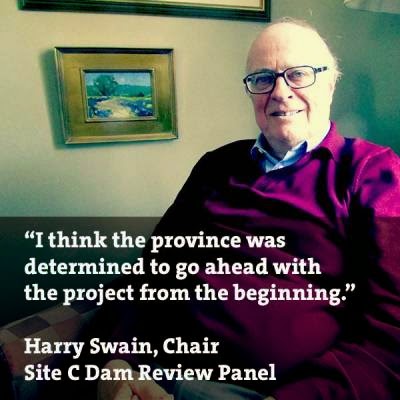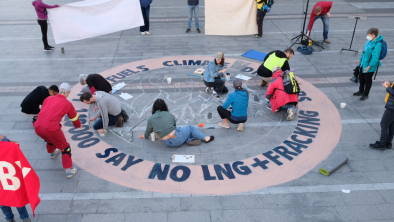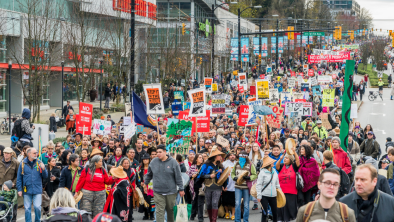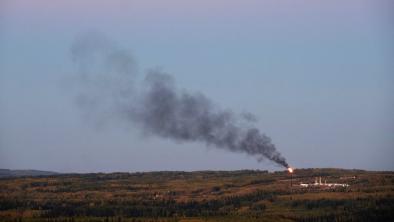Head of review panel repeats call for delay to BC Hydro’s Site C
Tuesday, March 10, 2015
The Globe and Mail

The B.C. government was wrong to approve construction of the $8.8-billion Site C dam project without an independent examination of cost and need, says the head of the joint review panel that spent nine months evaluating the environmental impact of the proposal.
BC Hydro received a green light from Victoria to undertake the province’s largest public infrastructure project last December.
The government has exempted the project from a regulatory review by the B.C. Utilities Commission, allowing Hydro to plan to put shovels in the ground this summer.
Harry Swain, who headed the federal-provincial environmental review process which ended last May, maintains construction should be delayed.
“Federal and provincial governments have become impatient with these endless environmental reviews that get in the way of progress. I sympathize with them – we won the Second World War in six years, it is going to take longer than that to build this dam,” Mr. Swain said Tuesday.
However, he said a delay would be healthy in this case to verify how much power the province needs, and to confirm how much Site C will cost. Since the panel report was delivered, the estimated project cost has climbed by nearly a billion dollars, from $7.9-billion, and Hydro has had to reject bids on the site-clearing contracts because they did not meet the requirements.
A delay would also provide more time to negotiate agreements with First Nations that are currently heading to court to block the project, and would provide clarity around how much industrial power will be needed to fuel a liquefied natural gas industry.
A number of projects are expected to announce final investment decisions in the next year, but so far there have been no final investment decisions.
“Cutting the B.C. Utilities Commission out of the process was unwise,” Mr. Swain said.
Energy Minister Bill Bennett told reporters Tuesday that Mr. Swain is “misinformed” and there is no need for further review.
“The project’s been on the books for 30 years. For the last seven years it’s been scrutinized, analyzed intensively by BC Hydro,” he said. As well, the budget figures have been verified by independent contractors, the Ministry of Finance and an outside accounting firm. “In all of those cases, everyone came back after looking at the work that Hydro had done on the budget and said ‘we think the budget is solid.’”
In their report last spring, the three-member review panel concluded that Hydro had not made the case for Site C.
The panel agreed the province will need more power, and that the Site C dam appears to be the most economical solution with the smallest output of greenhouse gas emissions. However, the panel concluded: “The proponent has not fully demonstrated the need for the project on the timetable set forth.”
As well, the panel warned the project will result in serious adverse effects on the traditional hunting, fishing and other land uses of First Nations, and the creation of an 83-kilometre reservoir on the Peace River would cause significant adverse effects on wildlife and sensitive ecosystems.


